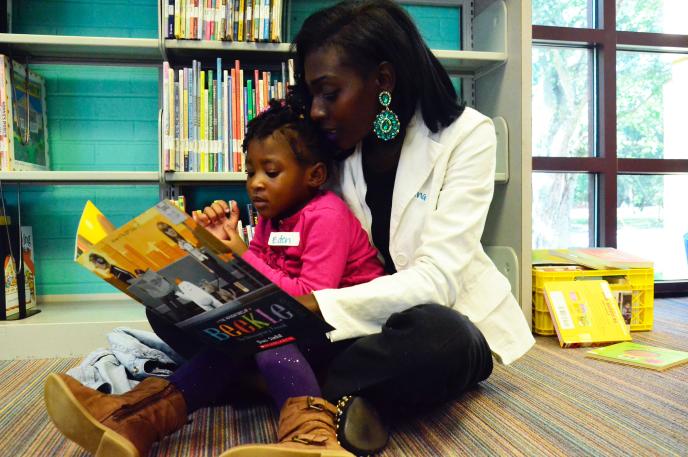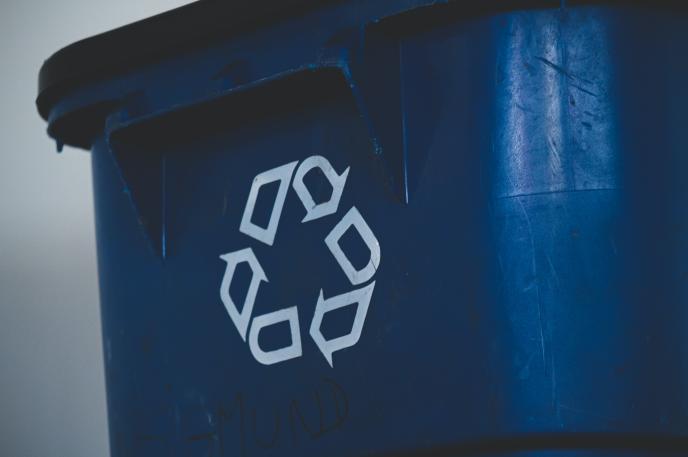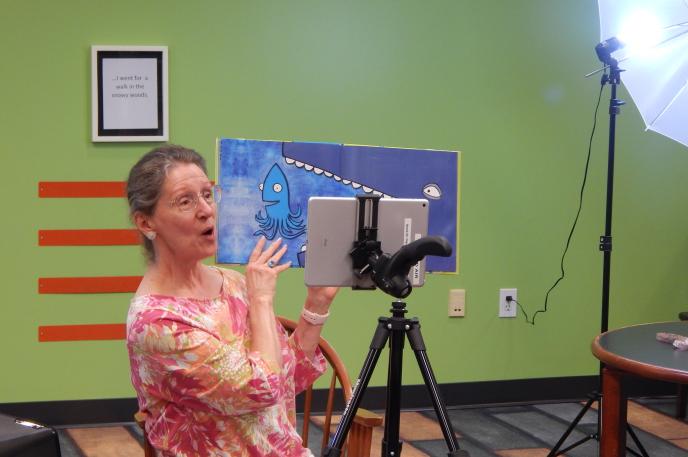Pamela McCarter
Martha Yesowitch
Harold Escalante
Karen Beach
Emily Nanney

Join the Library for an I Can read Black stories storytime program for Día
April 15, 2021
This blog was written as part of Charlotte Mecklenburg Library's Black Lives Matter program initiative. Learn more about the program and corresponding events here.
In June 2020, Charlotte Mecklenburg Library made a statement that “systemic racism and inequity have no place in our Library as we stand up for equity, access, inclusion, diversity and democracy.” Library staff has been working to find ways to support our community by creating opportunities to learn and dialogue with one another through Library programs and resources.
As part of the Library's commitment to Black Lives Matter programming, a new Storytime series, "i can Read Black Stories" launched on Saturday, January 2, 2021. The target audience for the weekly program is families with children between the ages 0-5. During Storytime diverse Library staff members read picture books that feature characters who are Black, African American or people of color. The stories, songs, and movement activities will support empathy and understanding of issues affecting the Black community and offer strategies to foster conversations on equity and inclusivity.
Some books like The Other Side by Jacqueline Woodson or Ruth and the Green Book by Alexander Ramsey Calvin have historical overtones, while others like Baby Goes to Market by Atinuke and Sonya’s Family by Elliot Riley feature “everyday diversity.” Books to affirm and empower, like I Am Every Good Thing by Derrick Barnes and I Am Enough by Grace Byers are also shared often.
Why read Black stories? Educator Rudine Sims Bishop, professor emerita at The Ohio State University, devoted her career to multicultural literacy. In her seminal work, Mirrors, Window, and Sliding Glass Doors she writes, “When children cannot find themselves reflected in the books they read, or when the images they see are distorted, negative, or laughable, they learn a powerful lesson about how they are devalued in the society of which they are a part.”
Of the 3,717 children’s books published in the United States in 2019, only 1,094 of them were about Black, Indigenous and/or Persons of Color (BIPOC). Data on books by and about Black, Indigenous and People of Color published for children and teens is compiled by the Cooperative Children’s Book Center, School of Education, University of Wisconsin-Madison. The Cooperative Children’s Book Center determines that a book is about characters of a specific ethnicity or racial identity if the main character is BIPOC or if a BIPOC character or real person is featured significantly in the book, even if the main character is white. If the main character is white and there are secondary characters of color who do not play a key role in the story, then a book is not considered to be about BIPOC.
Charlotte Mecklenburg Library celebrates Día during April. Día is a nationally recognized initiative that emphasizes the importance of literacy for all children from all backgrounds. It is a daily commitment to linking children and their families to diverse books, languages, and cultures. On Saturday, April 24 at 11 a.m., join the Children’s Services department for a special Día-themed I Can Read Black Stories program. The program which will be live streamed via the Facebook Page for ImaginOn: The Joe & Joan Martin Center. It will celebrate Afro-Hispanic and Afro-Latino authors and illustrators and Afro-Hispanic and Afro-Latino characters. To watch live Storytime programs visit the ImaginOn's Facebook page: https://www.facebook.com/ImaginOn/ and choose “LIVE” on the left-hand navigation list. There will be a red dot next to the word “LIVE” to indicate that Storytime is in session.
Learn more about the program here
Programs like Día and i can Read Black Stories help children to embrace diversity by accepting differences in others. Teaching children to accept differences when they are young helps them to have responsible, caring and positive social interactions when they are older. We hope that you will join us for these programs as we further our mission to improve lives and build a stronger community.
--
This blog was written by Alesha Lackey, children’s services manager at Allegra Westbrooks Regional Library.

Learn to recycle right with Charlotte Mecklenburg Library and Mecklenburg County.
April 19, 2021
Mecklenburg County 7 Recycling FAQs & Answers
On May 11, Charlotte Mecklenburg Library will host a FREE webinar to teach our patrons ages 12+ how to Recycle Right! Advanced registration is required to receive the participation link. Recycling resources will be shared with registrants before and after the program.
Library staff is organizing the event with two residential recycling educators. In preparation for the event we asked the public educators what they most need residents to understand. They didn’t hesitate to explain how materials need to be prepared correctly to be efficiently sorted at the recycling center. Here are their two critical requests:
- Do not bag recyclables! Plastic bags cause tremendous operational and financial challenges for our processing facility. No flexible plastic wraps, films, bags or packaging should ever be put in the recycling cart.
- Recyclables must be loose, clean, dry and empty! Recyclable items must be placed individually in the recycling cart, not in bags, for the separation equipment to function properly. Never put one type of recyclable inside of another (i.e. aluminum cans in a cardboard box.) All recyclables must be non-contaminated. This means every individual item must be clean, dry and empty, with no residue of the original contents (i.e. food.)
Following are the questions solid waste staff receive weekly*:
*Please note these are the recycling guidelines for Mecklenburg County, requirements may differ slightly in other counties.
- What plastic items can I put in my residential curbside cart?
ONLY plastic bottles and jugs, with a pourable neck or spout that is smaller at the top than the base, are accepted. These are the only pure plastic types that we can sell on the recyclable materials commodity market. Labels do not need to be removed.
Examples include: Water and soda bottles of any colors, milk or juice jugs, laundry jugs, shampoo or lotion bottles (pumps should be removed and trashed first.)
Please note the following common household plastics are not accepted in Curbside Recycling:
Plastic bags/bubble wrap, produce clamshells, yogurt cups, dairy tubs, takeout food containers, styrofoam, zip pouches, vitamin and medication bottles, disposable utensils and plastic cups, buckets, storage containers, hoses.
- What recycling symbol numbers (1, 2, 5, 7 etc.) are accepted locally?
None. See question FAQ #1 above listing the only plastics that are acceptable.
The RICs (resin identification codes) listed inside the chasing arrows triangle on the bottom of plastic packaging are, unfortunately, no longer reliable. Therefore, we do not use them anymore.
- What do I do with lids and caps?
Never place loose lids or caps in the recycling cart. Loose lids and caps are small and fall through our machines and end up contaminating the glass that is collected. Glass mixed with plastic and metal caps (among other things) cannot be sold to processors as raw materials as it is considered contaminated – so keep the plastic caps on the bottles.
It is “ok” to leave securely attached plastic caps and lids on clean, dry and empty cartons, bottles, jugs and jars. Never try to recycle caps by themselves.
- How much grease is tolerated to recycle pizza boxes?
Somewhere between a smidge and a tad; Yes that is an intentionally vague answer! Of course we prefer to only accept clean and dry cardboard to only process and sell by the ton the highest quality recyclables. We definitely do not want whole pieces of pizza or crust left in the box (yes it happens!) Cheese, sauce and crumbs are also contaminants. If ½ your box is clean, rip that part off to recycle and please trash anything with food or grease residue.
- Are aluminum foil and pans (pie, lasagna, roasting) recyclable?
No. Our machines can only recognize and sort aluminum cans. Additionally, more often than not these common aluminum food storage items are contaminated with food. Remember we do not want food residue on anything.
- How do I dispose of household batteries?
Rechargeable batteries must be disposed of properly because they contain hazardous elements such as lithium, nickel, and metal hydrides. Never place rechargeable batteries in your trash or recycling carts as they are the number one cause of fires at our facilities. Please take rechargeable batteries to the household hazardous waste station at one of our full service drop off centers.
Traditional alkaline batteries can be put in the trash to be sent to the landfill, because they do not contain any hazardous elements.
- What types of glass can be recycled?
Similar to plastics (see FAQ #1), only glass bottles and jars typically used in your kitchen or bathroom are accepted. All colors of glass are accepted. Caps and lids can remain on, if securely attached, (see FAQ #3). Labels do not need to be removed.
We prefer separated glass be brought to our full service drop off centers and deposited into the large yellow dumpsters marked, “Clean Glass Only.”
Please note the following common household glass items are not accepted:
Dishes and glasses, pyrex/corning ware, vases, bulbs, picture frames, windows, aquariums, ceramics, porcelain, crystal.
To learn more and have all of your questions answered live, please register for an upcoming Recycle Right presentation. If you still have questions, email [email protected] or visit wipeoutwaste.com.
--
This blog was written by Maitri Meyer, residential waste reduction educator for Mecklenburg County.

Let’s get organized with Joanna Clausen of NEST Organizing
April 20, 2021
Does the clutter in your home have you feeling stressed and overwhelmed? Does your home look out of control? An organized home helps you focus more, it relieves stress and saves you time. It improves your overall health.
Join us online as Joanna Clausen, Owner of NEST Organizing in Huntersville, NC, shares her tips and tricks for getting organized. Joanna is a mother of three and a professional organizer. She uses her passion for organization to help others take control of their home and stuff. Learn more about Joanna here.
To learn the NEST organization process for how to reset, declutter, sort, purge and clean:
May 4, 2021 at 7 p.m. Register here.
May 5, 2021 at 6 p.m. Register here
Make cooking meals easier by having a clean and ready-to-go kitchen. To learn techniques to organize your kitchen and pantry:
May 11, 2021, at 7 p.m. Register here.
May 12, 2021 at 6 p.m. Register here.
Turn your home office into a productive workspace. To declutter and sort your home office and papers:
May 18, 2021 at 7 p.m. Register here.
May 19, 2021 at 6 p.m. Register here.
Keep, donate, trash and shred. This is a personal journey. Let’s create organizational habits, reenergize your home and organize for success.

Storyvine 2021 goes digital
April 22, 2021
Once upon a time there was a storytelling festival. It was derailed by an evil pandemic until, one day, a fearless team of storytellers put their magical forces together to conquer the odds and climb the mighty fortress of digital programming and (cue dramatic music)… share their stories with the world!
Since 1976, the Charlotte Mecklenburg Library has been partnering with Charlotte Mecklenburg Schools to introduce as many local children in grades K-5 as possible to the artform of oral and traditional storytelling. A team of Library staffers across all 20 Library branches raise their hands each May to become the Frontline Storytellers, heading into CMS partner schools to tell stories from all over the world to thousands of Charlotte school children in a single day.
Although unable to participate in 2020, the Charlotte Mecklenburg Library is thrilled to announce that we are back in full force with Storyvine 2021, which will be fully digital and open not just to CMS students but, for the first time ever, to the public as well.
On Thursday, May 6, 2021 from 9:30 a.m.-2:30 p.m., there will be more than 10 different storytellers sharing traditional tales on the ImaginOn Facebook page and Charlotte Mecklenburg Library YouTube channel every 30 minutes from Germany, Russia, Africa, England, Panama, the Caribbean, Peru, the Native American and Appalachian traditions, and more!
Download our calendar for a full schedule of stories and viewing links
If you’re a teacher or educator who would like to celebrate with us, we’ve created a lesson plan HERE with additional discussion points.
On behalf of the Charlotte Mecklenburg Library, we invite you to join us for this full-day digital storytelling experience as Storyvine 2021 lives on--dare we say--happily ever after.
--
This blog was written by Becca Worthington, children's librarian at ImaginOn: The Joe & Joan Martin Center.
